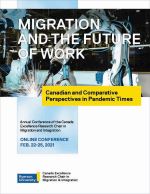Migration and the Future of Work: Canadian and Comparative Perspectives in Pandemic Times


From Feb. 22 to 25, 2021, the Canada Excellence Research Chair in Migration and Integration program held its second annual international conference. Our 2021 conference investigated the impact of technological change and the current pandemic on the future of work and how economic and social change are transforming labour migration around the world.
We are pleased to share the abstracts, presentations and video recordings of our panelists. In the resources below, you can watch or read about the observations and insights that were presented by experts, as well as their responses to the many thought-provoking questions from our audience.
If you have any questions about Migration and the Future of Work or our plans for 2022, please contact us at CERC.Migration@ryerson.ca.
Conference Overview
During the first two decades of the 21st century, we have witnessed important socio-economic transformations largely driven by advances in information and communication technology. But before we even begin to project into the future, the global pandemic requires that we apply a new lens to our long-term views about migration. Nations have introduced new rules for who and how many people they admit into their country. Will these new priorities persist into the future? Almost a full year into the pandemic, highly skilled migration remains at a standstill, and low-skilled migration has been prioritized as essential, and yet work remains precarious.
This immediate refocus must be applied to the longer-term structural change that has been underway for some time. Global value chains have become increasingly important, and delocalization in the production of both goods and services has intensified. Competition for global talent has increased, while highly skilled migration and diversity in the workplace are now recognized as drivers of innovation. Artificial intelligence is expected to shape the future of work in ways that we cannot yet fully grasp, though we know emotional or communicative skills cannot be replaced by machines.
These many changes are affecting both the governance of international migration and the integration of migrants into the workforce. This conference provided an opportunity to discuss these challenges and to investigate the complex dynamics between technological changes, labour market transformation and international migration. The topics covered have both a Canadian and international perspective, with a special focus on member countries of the Organization for Economic Co-operation and Development (OECD).
Program Abstracts, Powerpoint Presentations & Video Recordings
Opening roundtable addressing Migration and the Future of the Canadian Economy: Insights after the Pandemic with:
- Anna Triandafyllidou, Canada Excellence Research Chair in Migration and Integration, Ryerson University (Chair)
- Douglas Porter, Chief Economist and Managing Director, BMO Financial Group
- Mohamad Fakih, Chief Executive Officer, Paramount Fine Foods
- Zabeen Hirji, Executive Advisor, Future of Work, Deloitte and Board Chair, CivicAction, and
- Jean-Christophe Dumont, Head, International Migration Division, OECD
Session 1: The Global Race for Talent with
- Alexandra Cutean, Senior Director, Policy and Research, Information and Communications Technology Council (Chair)
- Ian Goldin, Professor of Globalisation and Development, University of Oxford
- William Boulding, J.B. Fuqua Professor and Dean, Duke University
- Huiyao Wang, Founder and President, Center for China and Globalization, and
- Meng-Hsuan Chou, Associate Professor, Provost's Chair in Public Policy and Global Affairs, Nanyang Technological University
Session 2: Skills, Competences and Migrant Talent: Is the Points System Fit for Purpose? with:
- Naomi Alboim, Senior Policy Fellow, CERC Migration, Ryerson University (Chair)
- Rupa Banerjee, Associate Professor of Human Resource Management and Organizational Behaviour, Ryerson University
- Anna K. Boucher, Associate Professor of Public Policy and Comparative Politics Politics, and Chris Wright, Associate Professor in Work and Organisational Studies, University of Sydney, and
- Madeleine Sumption, Director, and Peter Walsh, Fellow, Migration Observatory, Centre on Migration, Policy and Society (COMPAS), University of Oxford
Session 3: The Platform Economy: Racialized and Gendered? with:
- Jenna Hennebry, Associate Professor and Director, International Migration Research Centre, Wilfrid Laurier University (Chair)
- Niels van Doorn, Assistant Professor of New Media and Digital Culture, and Darsana Vijay, Research Assistant, University of Amsterdam
- Gig work in Canada today: Contextualizing precarious work Karen E. McCallum, Senior Research Associate, Diversity Institute, Future Skills Centre, Ryerson University
- An unlikely stepping stone? Exploring how platform work shapes newcomer migrant integration Anna Triandafyllidou, Canada Excellence Research Chair in Migration and Integration, and Laura Lam, Researcher, CERC Migration, Ryerson University
Session 4: Essential Migrant Workers and the Future of Work, with:
- Ito Peng, Canada Research Chair in Global Social Policy, University of Toronto (Chair)
- Philip Martin, Professor Emeritus, Agricultural and Resource Economics, University of California, Davis
- Margaret Walton-Roberts, Professor of Geography and Environmental Studies, Wilfrid Laurier University, and
- Sabrina Marchetti, Associate Professor of Sociology, Ca’ Foscari University of Venice
Session 5: Migrant Decision-Making in Pandemic Times
- Hélène Syed Zwick, Executive Director, École Supérieure Libre des Sciences Commerciales Appliquées (ESLSCA) University (Chair)
- Igor Grossmann, Associate Professor of Psychology, University of Waterloo
- Francis L. Collins, Professor of Geography, University of Waikato
- Shamira Madhany, Managing Director, Canada and Deputy Executive Director, World Education Services
Session 6: Closing Policy Roundtable: Economic Recovery, Migration and Innovation: Is Our Migration Governance Framework Future Ready? with:
- Anna Triandafyllidou, Canada Excellence Research Chair in Migration and Integration, Ryerson University (Chair)
- Kathleen Newland, Senior Fellow and Co-Founder, Migration Policy Institute
- Brenda Yeoh, Raffles Professor of Social Sciences, National University of Singapore
- Jean-Christophe Dumont, Head, International Migration Division, Organisation for Economic Co-operation and Development
- Peter Scholten, Professor of Migration and Diversity Policy, Erasmus University Rotterdam
For more information
Please email cerc.migration@ryerson.ca.


